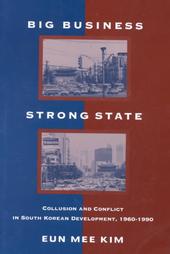 Big business, strong state: collusion and conflict in South Korean development 1960-1990; Eun Mee Kim
Big business, strong state: collusion and conflict in South Korean development 1960-1990; Eun Mee KimPostarší leč výtečná kniha o ekonomickém rozvoji Jižní Koreje, analyzující vztahy mezi Parkovým (a Chunovým) režimem a chaeboly v rozpětí 30 let fenomenálního hospodářského růstu. Zatímco za Parka to byl stát, kdo pevně držel opratě, s růstem velikosti a síly chaebolů (paradoxně právě díky úspěšné hospodářské politice režimu) se situace změnila, a chaeboly se staly silnější a nezávislé na státu. Na rozdíl od většiny standardních popisů Han river miracle Kim neopomněla zmínit, že cenou za rozmach byla trvající chudoba a represe pracujících jihokorejců. Zajímavé bylo také, že velkou roli v zlepšení pracovních podmínek a zakládání odborů na konci 80. let hráli vysokoškolští studenti. Několik krátkých úryvků:
Along with repressive labor policies toward unions and their activities, the state kept wages low to keep SK products competitive in the world market. Despite rising productivity, real wages did not rise. Real wages actually decreased during the 1960s (1962-66 real wages -0.8%, productivity +8.5%!!!), and in the 1970s, real wages increased but often at a pace behind the growth rates of productivity (1967-71 real wages 11.2%, productivity 17.3%).
And this happened despite the fact that SK workers were working the longest hours in the world: 52.3 hours a week in 1970, which was up from 50.3 hours a week in 1960. In 1970, the average monthly wages went up to only $45.16 from $35.85 in 1960. The % figure for SK wages as a proportion of US wages actually decreased from 9 to 8 percent from 1960 to 1970. During the same period ... Hong Kong experienced more than a doubling of its workers' wages from $67.92 in 1960 to $136.24 in 1970. The relatively small gain made by the SK workers is a painful remainder that SK's economic development came at the price of repressing labor.
More activists were arrested, sentenced to jail terms, and expelled from colleges and universities during eight years under Chun Doohwan, compared to the previous eighteen years during Park regime. And many of these students became disguised factory workers. An unofficial estimate shows that over 3000 students became blue-collar workers in the 1980s, concealing their college education so that they can be hired in jobs that specifically required less than a high school education. They played a critical role in organizing unions and in generating militant labor movements, utilizing organizational skills they acquired from student movements. Between 1985 and 1986 alone, the police reported that 671 such "agitators" were arrested.

2 comments:
jeste, ja vim, ze ted moc nepisu, ale casem se to zmeni, presto, muzu zase repostnout tvoje prispevky na koreu?
diks...
Samozrejme ze muzes...
Post a Comment